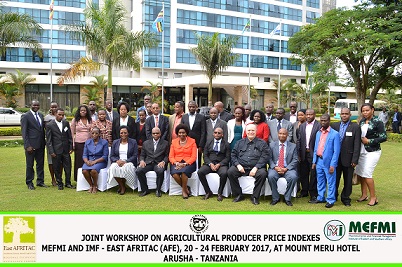- March 21, 2017
- Posted by: admin
- Category: Current News


MEFMI and EAST AFRITAC conducted a joint regional workshop on developing Agriculture Producer Price Index (APPI) from 20 to 24 February 2017 at Mount Meru Hotel, Arusha, Tanzania. Representing the MEFMI secretariat office were Dr. Sehliselo Mpofu – Director, Macroeconomic Management Programme (MMP), Mr. Senei Molapo – Programme Manager, MMP and Ms Margaret Mutyorauta – Programme Assistant, MMP while the East AFRITAC was represented by Ms. Pamela Audi, STA Advisor and Ms. Diana Makiko, Administrative Assistant. A total of 28 participants attended the workshop of which 8 were female, representing 29 percent of the total. The workshop was facilitated by IMF Resource Persons (2), Mr. Edwin St Catherine (West Indies, St Lucia – STA Short term Expert) and Mr. Dale Smith (Farmington USA – STA Short term Expert).
The workshop was officially opened by Mrs. Generose Tabaro, Bank of Tanzania Branch Director, Arusha, on behalf of the Governor, Prof. Benno Ndulu. In her remarks, Mrs. Tabaro welcomed everyone to the workshop on the Agricultural Producer Price Index (APPI) and wished them all, fruitful discussions. She asked the participants to take time during their spare time to explore Tanzania as it is a country with many tourist attractions. She mentioned that approximately 38 percent of Tanzania’s land area is set aside in protected areas for conservation. There are 16 national parks, 29 game reserves, 40 controlled conservation areas including the Ngorongoro Conservation Area and marine parks. She then said that Tanzania is also home to Mount Kilimanjaro, the highest point in Africa. She then commended MEFMI and East AFRITAC for realizing the need for the workshop as it constitute of the first steps in a journey that should be taken to build capacity in the region in APPI construction and analysis. She outlined that the region was most grateful for the sustained technical support and for the close collaboration between MEFMI and IMF EAST AFRITAC staff, which has strengthened capacity building efforts. She went on to say that the region has made the most out of this support and registered progress in refining capacity and skills in the quest to develop relevant and applicable methodologies for Member States. She then emphasized that there was a need for countries to compile statistics in harmonized and comparable ways so that they could make reliable international comparisons of economic performance and behaviour using the best international practices. Statisticians in each country should not have to decide on methodological issues entirely on their own, but, that they required support from of workshops like the APPI one.
Mr. Senei Molapo delivered the MEFMI remarks. He started by thanking Mrs. Generose Tabaro for the welcoming remarks and official opening of the workshop. He also thanked East AFRITAC, the IMF resource persons, the participants’ principals and the participants themselves, all for making the workshop successful. He explained the concept of APPI and its importance after outlining that MEFMI and East AFRITAC will continue to scale-up delivery of capacity interventions in order to visibly contribute to the creation of sound and stable macroeconomic conditions in the region.
The workshop focused on developing improved and harmonised methodologies of collecting statistics for agricultural commodity prices and constructing Agriculture Price Index. It was designed to provide training in the Construction of an APPI, based on the conceptual framework of the IMF PPI Manual. Developing organisations endorsed the principles and recommendations contained in the Manual as good practice for statistical agencies in conducting a PPI program.
The APPI measures the rate of change in the prices of goods and services that are bought and sold by agricultural producers. Users need to be aware of the methods employed by statistical offices in collecting data and compiling the indices as well as the potential such indices have for errors and biases. This will assist users to properly interpret the results and contribute to informed evidence-based economic policy management.
The workshop introduction session covered the principles of the new PPI Manual, Uses of PPIs; overview of the PPI and its compilation; Concept of price and volume measures; PPI Concepts and classifications; Conceptual Issues and Data Requirements; sources of weights; sample design and implementation; calculation of Elementary Indexes; compilation of PPIs; calculation of Unweighted Elementary Indexes; aggregate Index Compilation; imputation for Missing Values; Adjustments for quality change; treatment of special products – Goods; and treatment of special products – Services.
Participants were also given practical exercises using case studies from the European Union (EU) and South Africa. This helped to reinforce concepts and methodologies covered during the presentations. Country delegations also presented their experiences in developing APPI. The participants included middle to senior officials responsible for National Accounts compilation and usage from statistics offices, Ministries of Finance and Planning and Central Banks.
The workshop was officially closed by Dr. Mpofu who also issued the participants’ certificates. She thanked everyone and stressed that she was convinced that for the time spend, they have been able to share useful skills and knowledge in subject of APPI that will be useful in your country and the region as whole.
